If you are not already aware, the Bank of Canada holds exactly ZERO tonnes of gold in its reserves.
Yes, you read that correctly.
In 2016, the BoC sold its last tonne of gold and has not bought any since then, even while inflation continues to creep higher and other countries continue to stockpile the metal.
Anyone with a basic understanding of economics will probably be left shocked and frustrated by this.
I would like to direct everyones attention to this Kitco piece which outlines why the Bank of Canada decided to do so: https://www.kitco.com/news/2022-05-26/Gold-is-an-antique-instrument-This-is-why-Canada-sold-all-its-gold-reserves-former-BOC-head-David-Dodge.html
So, why did they do it? Well, according to former BoC head, David Dodge, here is the main reason:
“[The] issue is quite clear, that it costs to hold gold, whereas holding U.S. or Chinese or Euro bonds yields you a return,” said Dodge. “…That was a strong view. And a view that our international monetary system was in a place that was sufficiently robust, that holding this antique instrument of stability called ‘gold’ really didn’t make any sense.”
Now you might be feeling even more frustrated, and understandably so.
In essence, the BoC is opting to hold foreign bonds over gold (U.S., Chinese, and Euro Bonds) because they yield a return and do not come with storage costs.
In my opinion, this is outrageous, borderline disturbing, and likely politically motivated.
Rather than holding an asset that has held its value over the entire course of human history, the BoC would rather hold foreign bonds which are dependent on the economies of other countries.
Over the last few years, inflation has continued to reach new highs and economies around the world have begun to stagnate — yet, Canada’s gold reserves have remain unchanged at ZERO. Meanwhile, other countries, included those of which BoC decided to buy their bonds, are stockpiling gold.
Here is a map showing gold reserves by country around the world:

As we can see, Canada is literally the only developed country in the world that does not hold any gold reserves, and the only G7 country that does not hold at least 100 tonnes of gold reserves.
Mind blowing.
To quote the BoC directly, there is a “long-standing policy of diversifying its portfolio by selling physical commodities (such as gold) and instead investing in financial assets that are easily tradable and that have deep markets of buyers and sellers.”
This makes absolutely no sense!
Gold is not just a commodity – it is money itself, as it has been for over 3,000 years. It is traded daily on the currency desks of major banks around the world. That puts gold in the same category as the US dollar, the euro, and other currencies.
The physical gold market is estimated to have an average daily turnover of upwards of US$24 billion daily in both cleared and uncleared OTC markets, according to statistics from the London Bullion Market Association (LBMA). This makes daily gold turnover trading in the London market on par with the major currencies, and larger than all bond markets, except for the US Treasury bond market and the Japanese government bond market. Gold trades in one of the most liquid markets in the world.
In the past, central banks have purchased gold in order diversify their reserve portfolios, especially away from US dollar-denominated assets, with which gold has a strong negative correlation.
The Bank of Canada has done the opposite — selling their gold reserves to diversify their portfolios, opting for assets that have a strong correlation with U.S. dollar-denominated assets.
Central banks have also used gold to hedge against tail risks, or because of inflation hedging characteristics, because gold has maintained its purchasing power over a long period of time.
Again, the Bank of Canada has done the opposite — and at the worst possible time. While inflation in Canada is reaching its highest point in decades, we continue to hold ZERO gold.
The BoC’s backwards thinking will soon cause them to deeply regret their decision to sell off their gold reserves — that is, if they are not regretting doing so already.
-SmallCapInvestor


